2011年普通高等学校招生全国统一考试(广东卷)-英语(Word版)
- 格式:doc
- 大小:132.00 KB
- 文档页数:12
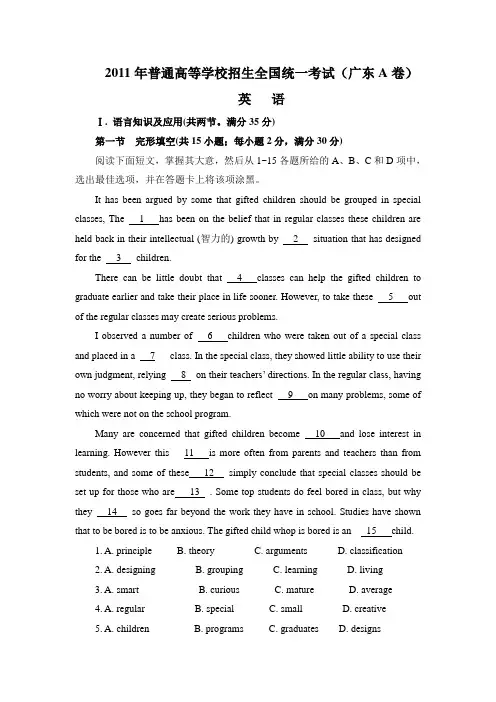
2011年普通高等学校招生全国统一考试(广东A卷)英语Ⅰ. 语言知识及应用(共两节。
满分35分)第一节完形填空(共15小题;每小题2分,满分30分)阅读下面短文,掌握其大意,然后从1~15各题所给的A、B、C和D项中,选出最佳选项,并在答题卡上将该项涂黑。
It has been argued by some that gifted children should be grouped in special classes, The 1 has been on the belief that in regular classes these children are held back in their intellectual (智力的) growth by 2 situation that has designed for the 3 children.There can be little doubt that 4 classes can help the gifted children to graduate earlier and take their place in life sooner. However, to take these 5 out of the regular classes may create serious problems.I observed a number of 6 children who were taken out of a special class and placed in a 7 class. In the special class, they showed little ability to use their own judgment, relying 8 on their teachers‟ directions. In the regular class, having no worry about keeping up, they began to reflect 9 on many problems, some of which were not on the school program.Many are concerned that gifted children become 10 and lose interest in learning. However this 11 is more often from parents and teachers than from students, and some of these 12 simply conclude that special classes should be set up for those who are 13 . Some top students do feel bored in class, but why they 14 so goes far beyond the work they have in school. Studies have shown that to be bored is to be anxious. The gifted child whop is bored is an 15 child.1. A. principle B. theory C. arguments D. classification2. A. designing B. grouping C. learning D. living3. A. smart B. curious C. mature D. average4. A. regular B. special C. small D. creative5. A. children B. programs C. graduates D. designs6. A. intelligent B. competent C. ordinary D. independent7. A. separate B. regular C. new D. boring8. A. specially B. slightly C. wrongly D. heavily9. A, directly B. cleverly C. voluntarily D. quickly10. A. doubted B. bored C. worried D. tired11. A. concern B. conclusion C. reflection D. interest12. A. students B. adults C. scholars D. teachers13. A. talented B. worried C. learned D. interested14. A. believe B. think C. say D. feel15. A. outstanding B. intelligent C. anxious D. ordinary第二节语法填空(共10小题;每小题1.5分,满分15分)阅读下面短文,按照句子结构的语法性和上下文连贯的要求,在空格处填入一个适当的词或使用括号中词语的正确形式填空,并将答案填写在答题卡标号为16~25的相应位置上。
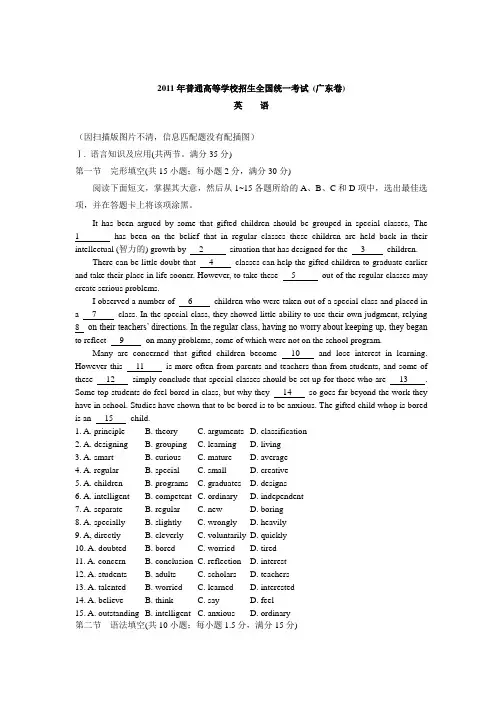
2011年普通高等学校招生全国统一考试(广东卷)英语(因扫描版图片不清,信息匹配题没有配插图)Ⅰ. 语言知识及应用(共两节。
满分35分)第一节完形填空(共15小题;每小题2分,满分30分)阅读下面短文,掌握其大意,然后从1~15各题所给的A、B、C和D项中,选出最佳选项,并在答题卡上将该项涂黑。
It has been argued by some that gifted children should be grouped in special classes, The 1 has been on the belief that in regular classes these children are held back in their intellectual (智力的) growth by 2 situation that has designed for the 3 children.There can be little doubt that 4 classes can help the gifted children to graduate earlier and take their place in life sooner. However, to take these 5 out of the regular classes may create serious problems.I observed a number of 6 children who were taken out of a special class and placed ina 7 class. In the special class, they showed little ability to use their own judgment, relying8 on their teachers‟ directions. In the regular class, having no worry about keeping up, they began to reflect 9 on many problems, some of which were not on the school program.Many are concerned that gifted children become 10 and lose interest in learning. However this 11 is more often from parents and teachers than from students, and some of these 12 simply conclude that special classes should be set up for those who are 13 . Some top students do feel bored in class, but why they 14 so goes far beyond the work they have in school. Studies have shown that to be bored is to be anxious. The gifted child whop is bored is an 15 child.1. A. principle B. theory C. arguments D. classification2. A. designing B. grouping C. learning D. living3. A. smart B. curious C. mature D. average4. A. regular B. special C. small D. creative5. A. children B. programs C. graduates D. designs6. A. intelligent B. competent C. ordinary D. independent7. A. separate B. regular C. new D. boring8. A. specially B. slightly C. wrongly D. heavily9. A, directly B. cleverly C. voluntarily D. quickly10. A. doubted B. bored C. worried D. tired11. A. concern B. conclusion C. reflection D. interest12. A. students B. adults C. scholars D. teachers13. A. talented B. worried C. learned D. interested14. A. believe B. think C. say D. feel15. A. outstanding B. intelligent C. anxious D. ordinary第二节语法填空(共10小题;每小题1.5分,满分15分)阅读下面短文,按照句子结构的语法性和上下文连贯的要求,在空格处填入一个适当的词或使用括号中词语的正确形式填空,并将答案填写在答题卡标号为16~25的相应位置上。
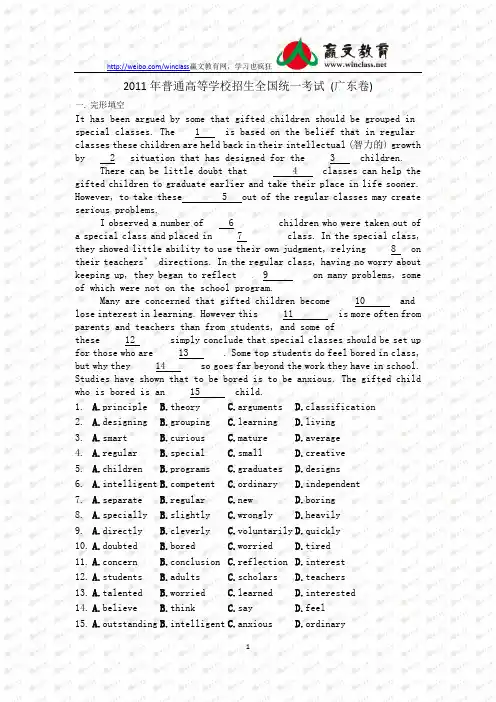
2011年普通高等学校招生全国统一考试(广东卷)一. 完形填空It has been argued by some that gifted children should be grouped in special classes. The 1 is based on the belief that in regular classes these children are held back in their intellectual (智力的) growthby 2 situation that has designed for the 3 children.There can be little doubt that 4 classes can help the gifted children to graduate earlier and take their place in life sooner. However, to take these 5 out of the regular classes may create serious problems.I observed a number of 6 children who were taken out of a special class and placed in 7 class. In the special class, they showed little ability to use their own judgment, relying 8 on their teachers’directions. In the regular class, having no worry about keeping up, they began to reflect 9 on many problems, some of which were not on the school program.Many are concerned that gifted children become 10 and lose interest in learning. However this 11 is more often from parents and teachers than from students, and some of these 12 simply conclude that special classes should be set up for those who are 13 . Some top students do feel bored in class, but why they 14 so goes far beyond the work they have in school. Studies have shown that to be bored is to be anxious. The gifted child who is bored is an 15 child.1. A.principle B.theory C.arguments D.classification2. A.designing B.grouping C.learning D.living3. A.smart B.curious C.mature D.average4. A.regular B.special C.small D.creative5. A.children B.programs C.graduates D.designs6. A.intelligent petent C.ordinary D.independent7. A.separate B.regular C.new D.boring8. A.specially B.slightly C.wrongly D.heavily9. A.directly B.cleverly C.voluntarily D.quickly10. A.doubted B.bored C.worried D.tired11. A.concern B.conclusion C.reflection D.interest12. A.students B.adults C.scholars D.teachers13. A.talented B.worried C.learned D.interested14. A.believe B.think C.say D.feel15. A.outstanding B.intelligent C.anxious D.ordinary答案及解析1 答案: C解析:提示一:【语篇解读】本文围绕尖子生该不该单独组成一个班级展开讨论。
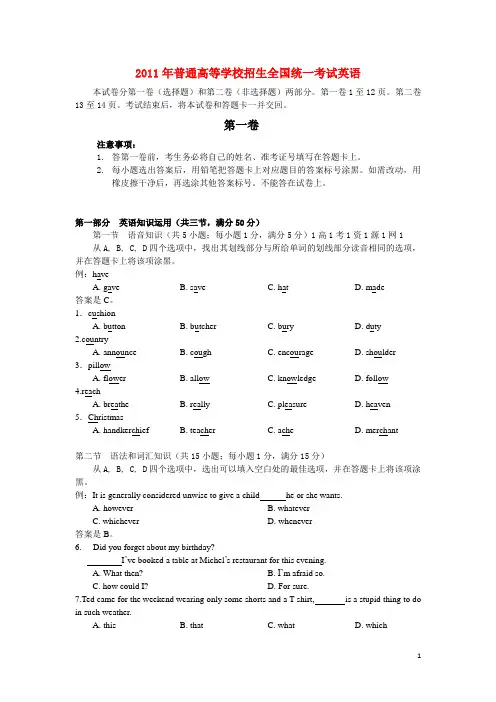
2011年普通高等学校招生全国统一考试英语本试卷分第一卷(选择题)和第二卷(非选择题)两部分。
第一卷1至12页。
第二卷13至14页。
考试结束后,将本试卷和答题卡一并交回。
第一卷注意事项:1.答第一卷前,考生务必将自己的姓名、准考证号填写在答题卡上。
2.每小题选出答案后,用铅笔把答题卡上对应题目的答案标号涂黑。
如需改动,用橡皮擦干净后,再选涂其他答案标号。
不能答在试卷上。
第一部分英语知识运用(共三节,满分50分)第一节语音知识(共5小题;每小题1分,满分5分)1高1考1资1源1网1 从A, B, C, D四个选项中,找出其划线部分与所给单词的划线部分读音相同的选项,并在答题卡上将该项涂黑。
例:haveA. gaveB. saveC. hatD. made答案是C。
1.cushionA. buttonB. butcherC. buryD. duty2.countryA. announceB. coughC. encourageD. shoulder 3.pillowA. flowerB. allowC. knowledgeD. follow4.reachA. breatheB. reallyC. pleasureD. heaven 5.ChristmasA. handkerchiefB. teacherC. acheD. merchant第二节语法和词汇知识(共15小题;每小题1分,满分15分)从A, B, C, D四个选项中,选出可以填入空白处的最佳选项,并在答题卡上将该项涂黑。
例:It is generally considered unwise to give a child he or she wants.A. howeverB. whateverC. whicheverD. whenever答案是B。
6.----Did you forget about my birthday?---- I’ve booked a table at Michel’s restaurant for this evening.A. What then?B. I’m afraid so.C. how could I?D. For sure.7.Ted came for the weekend wearing only some shorts and a T-shirt, is a stupid thing to do in such weather.A. thisB. thatC. whatD. which8.If you smoke,please go outside.A. canB. shouldC. mustD. may9.If you don't like the drink you______just leave it and try a different one.A. orderedB. are orderingC. will orderD. had ordered10.Mary,I_____John of his promise to help you.A. toldB. remindedC. warnedD. advised11.I got this bicycle for ;My friend gave it to me when she bought a new one.A. everythingB. somethingC. anythingD. nothing12.It is one thing to enjoy listening to good music,but it is another to play it well yourself.A. quiteB. veryC. ratherD. much13.Jane won’t join us for dinner tonight and .A. neither won’t TomB. Tom won’t eitherC. Tom will tooD. so will Tom14.This shop will be closed for repairs further notice.A. withB. untilC. forD. at15.The island,to the mainland by a bridge,is easy to go to.A. joiningB. to joinC. joinedD. having joined16.As he reached front door,Jack saw strange sight.A. the;不填B. a;theC. 不填aD. the;a 17.Mr.Stevenson is great to work for --I really couldn't ask for a_boss.A. betterB. goodC. bestD. still better 18.Sarah pretended to be cheerful,______nothing about the argument.A. says B:said C. to say D. saying19.It was a nice meal,_______a little expensive.A. thoughB. whetherC. asD. since20.-----So you gave her your phone?-----______she said she'd return it to me when she could afford her own.A. My pleasureB. Not exactlyC. No doubtD. All right第三节完形填空(共20小题;每小题1.5分,满分30分)阅读下面短文,从短文后各题所给的四个选项(A, B, C和D)中,选出可以填入空白处的最佳选项飞并在答题卡上将该项涂黑。
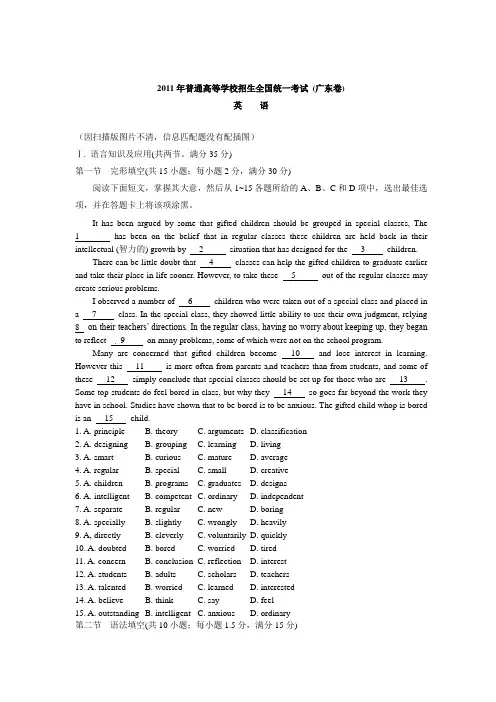
2011年普通高等学校招生全国统一考试(广东卷)英语(因扫描版图片不清,信息匹配题没有配插图)Ⅰ. 语言知识及应用(共两节。
满分35分)第一节完形填空(共15小题;每小题2分,满分30分)阅读下面短文,掌握其大意,然后从1~15各题所给的A、B、C和D项中,选出最佳选项,并在答题卡上将该项涂黑。
It has been argued by some that gifted children should be grouped in special classes, The 1 has been on the belief that in regular classes these children are held back in their intellectual (智力的) growth by 2 situation that has designed for the 3 children.There can be little doubt that 4 classes can help the gifted children to graduate earlier and take their place in life sooner. However, to take these 5 out of the regular classes may create serious problems.I observed a number of 6 children who were taken out of a special class and placed ina 7 class. In the special class, they showed little ability to use their own judgment, relying8 on their teachers’ directions. In the regular class, having no worry about keeping up, they began to reflect 9 on many problems, some of which were not on the school program.Many are concerned that gifted children become 10 and lose interest in learning. However this 11 is more often from parents a nd teachers than from students, and some of these 12 simply conclude that special classes should be set up for those who are 13 . Some top students do feel bored in class, but why they 14 so goes far beyond the work they have in school. Studies have shown that to be bored is to be anxious. The gifted child whop is bored is an 15 child.1. A. principle B. theory C. arguments D. classification2. A. designing B. grouping C. learning D. living3. A. smart B. curious C. mature D. average4. A. regular B. special C. small D. creative5. A. children B. programs C. graduates D. designs6. A. intelligent B. competent C. ordinary D. independent7. A. separate B. regular C. new D. boring8. A. specially B. slightly C. wrongly D. heavily9. A, directly B. cleverly C. voluntarily D. quickly10. A. doubted B. bored C. worried D. tired11. A. concern B. conclusion C. reflection D. interest12. A. students B. adults C. scholars D. teachers13. A. talented B. worried C. learned D. interested14. A. believe B. think C. say D. feel15. A. outstanding B. intelligent C. anxious D. ordinary第二节语法填空(共10小题;每小题1.5分,满分15分)阅读下面短文,按照句子结构的语法性和上下文连贯的要求,在空格处填入一个适当的词或使用括号中词语的正确形式填空,并将答案填写在答题卡标号为16~25的相应位置上。
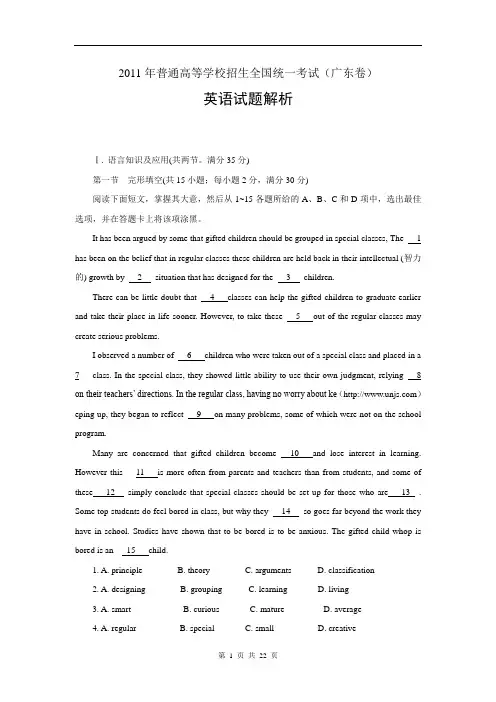
2011年普通高等学校招生全国统一考试(广东卷)英语试题解析Ⅰ. 语言知识及应用(共两节。
满分35分)第一节完形填空(共15小题;每小题2分,满分30分)阅读下面短文,掌握其大意,然后从1~15各题所给的A、B、C和D项中,选出最佳选项,并在答题卡上将该项涂黑。
It has been argued by some that gifted children should be grouped in special classes, The 1 has been on the belief that in regular classes these children are held back in their intellectual (智力的) growth by 2 situation that has designed for the 3 children.There can be little doubt that 4 classes can help the gifted children to graduate earlier and take their place in life sooner. However, to take these 5 out of the regular classes may create serious problems.I observed a number of 6 children who were taken out of a special class and placed in a7 class. In the special class, they showed little ability to use their own judgment, relying 8 on their teachers’ directions. In the regular class, having no worry about ke()eping up, they began to reflect 9 on many problems, some of which were not on the school program.Many are concerned that gifted children become 10 and lose interest in learning. However this 11 is more often from parents and teachers than from students, and some of these 12 simply conclude that special classes should be set up for those who are 13 . Some top students do feel bored in class, but why they 14 so goes far beyond the work they have in school. Studies have shown that to be bored is to be anxious. The gifted child whop is bored is an 15 child.1. A. principle B. theory C. arguments D. classification2. A. designing B. grouping C. learning D. living3. A. smart B. curious C. mature D. average4. A. regular B. special C. small D. creative5. A. children B. programs C. graduates D. designs6. A. intelligent B. competent C. ordinary D. independent7. A. separate B. regular C. new D. boring8. A. specially B. slightly C. wrongly D. heavily9. A, directly B. cleverly C. voluntarily D. quickly10. A. doubted B. bored C. worried D. tired11. A. concern B. conclusion C. reflection D. interest12. A. students B. adults C. scholars D. teachers13. A. talented B. worried C. learned D. interested14. A. believe B. think C. say D. feel15. A. outstanding B. intelligent C. anxious D. ordinary第二节语法填空(共10小题;每小题1.5分,满分15分)阅读下面短文,按照句子结构的语法性和上下文连贯的要求,在空格处填入一个适当的词或使用括号中词语的正确形式填空,并将答案填写在答题卡标号为16~25的相应位置上。
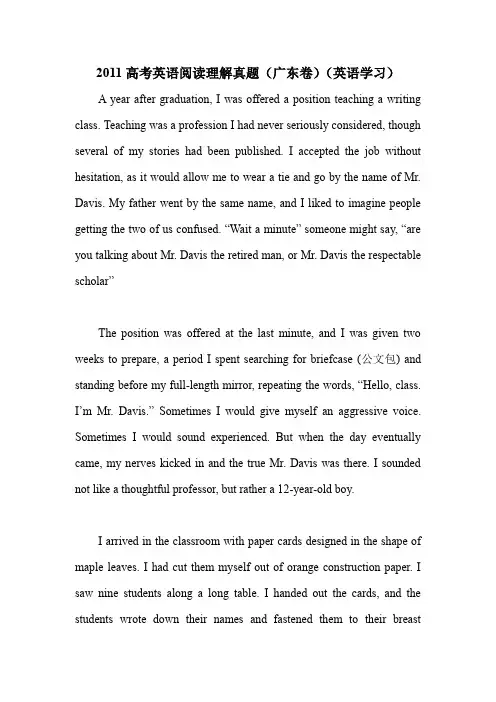
2011高考英语阅读理解真题(广东卷)(英语学习)A year after graduation, I was offered a position teaching a writing class. Teaching was a profession I had never seriously considered, though several of my stories had been published. I accepted the job without hesitation, as it would allow me to wear a tie and go by the name of Mr. Davis. My father went by the same name, and I liked to imagine people getting the two of us confused. “Wait a minute” someone might say, “are you talking about Mr. Davis the retired man, or Mr. Davis the respectable scholar”The position was offered at the last minute, and I was given two weeks to prepare, a period I spent searching for briefcase (公文包) and standing before my full-length mirror, repeating the words, “Hello, class. I’m Mr. Davis.” Sometimes I would give myself an aggressive voice. Sometimes I would sound experienced. But when the day eventually came, my nerves kicked in and the true Mr. Davis was there. I sounded not like a thoughtful professor, but rather a 12-year-old boy.I arrived in the classroom with paper cards designed in the shape of maple leaves. I had cut them myself out of orange construction paper. I saw nine students along a long table. I handed out the cards, and the students wrote down their names and fastened them to their breastpockets as I required.“All right then,” I said. “Okey, here we go.” Then I opened my briefcase and realized that I had never thought beyond this moment. I had been thinking that the students would be the first to talk, offering their thoughts and opinions on the events of the day. I had imagined that I would sit at the edge of the desk, overlooking a forests of hands. Every student would yell. “Calm down, you’ll all get your turn. One at a time, one at a time!”A terrible silence ruled the room, and seeing no other opinions, I inspected the students to pull out their notebooks and write a brief essay related to the theme of deep disappointment.36. The author took the job to teach writing because ______.A. he wanted to be expectedB. he had written some storiedC. he wanted to please his fatherD. he had dreamed of being a teacher37. What can we learn about the author from Paragraph 2A. He would be aggressive in his first class.B. He was well-prepared for his first class.C. He got nervous upon the arrival of his first class.D. He waited long for the arrival of his first class.38. Before he started his class, the author asked the students to ______.A. write down their suggestions on the paper cardsB. cut maple leaves out of the construction paperC. cut some cards out of the construction paperD. write down their names on the paper cards39. What did the students do when the author started his classA. They began to talk.B. They stayed silent.C. They raised their hands.D. They shouted to be heard.40. The author chose the composition topic probably because ______.A. he got disappointed with his first classB. he had prepared the topic before classC. he wanted to calm down the studentsD. he thought it was an easy topic【文章大意】本文是一篇记叙文。
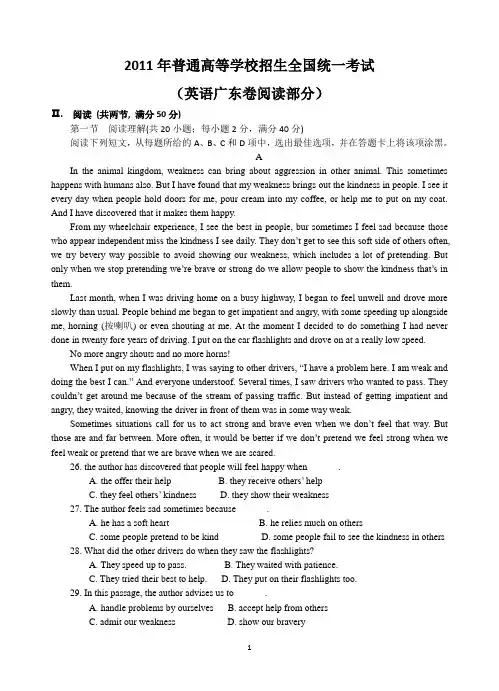
2011年普通高等学校招生全国统一考试(英语广东卷阅读部分)Ⅱ. 阅读(共两节, 满分50分)第一节阅读理解(共20小题;每小题2分,满分40分)阅读下列短文,从每题所给的A、B、C和D项中,选出最佳选项,并在答题卡上将该项涂黑。
AIn the animal kingdom, weakness can bring about aggression in other animal. This sometimes happens with humans also. But I have found that my weakness brings out the kindness in people. I see it every day when people hold doors for me, pour cream into my coffee, or help me to put on my coat. And I have discovered that it makes them happy.From my wheelchair experience, I see the best in people, bur sometimes I feel sad because those who appear independent miss the kindness I see daily. They don’t get to see this soft side of others often, we try bevery way possible to avoid showing our weakness, which includes a lot of pretending. But only when we stop pretending we’re brave or strong do we allow people to show the kindness that’s in them.Last month, when I was driving home on a busy highway, I began to feel unwell and drove more slowly than usual. People behind me began to get impatient and angry, with some speeding up alongside me, horning (按喇叭) or even shouting at me. At the moment I decided to do something I had never done in twenty fore years of driving. I put on the car flashlights and drove on at a really low speed.No more angry shouts and no more horns!When I put on my flashlights, I was saying to other drivers, “I have a problem here. I am weak and doing the best I can.” And everyone understoof. Several times, I saw drivers who wanted to pass. They couldn’t get around me because of the stream of passing traffic. But instead of getting impatient and angry, they waited, knowing the driver in front of them was in some way weak.Sometimes situations call for us to act strong and brave even when we don’t feel that way. But those are and far between. More often, it would be better if we don’t pretend we feel strong when we feel weak or pretend that we are brave when we are scared.26. the author has discovered that people will feel happy when ______.A. the offer their helpB. they receive others’ helpC. they feel others’ ki ndnessD. they show their weakness27. The author feels sad sometimes because ______.A. he has a soft heartB. he relies much on othersC. some people pretend to be kindD. some people fail to see the kindness in others28. What did the other drivers do when they saw the flashlights?A. They speed up to pass.B. They waited with patience.C. They tried their best to help.D. They put on their flashlights too.29. In this passage, the author advises us to ______.A. handle problems by ourselvesB. accept help from othersC. admit our weaknessD. show our bravery30. Which of the following is the best title for the passage?A. A Wheelchair Experience.B. Weakness and Kindness.C. Weakness and StrengthD. A Driving ExperienceBCan dogs and cats live in perfect harmony in the same home? People who are thinking about adopting a dog as a friend for their cats are worried that they will fight. A recent research has found a new recipe of success. According to the study, if the cat is adopted before the dog, and if they are introduced when still young (less than 6 months for cats, a year for dogs), it is highly probable that the two pets will get along swimmingly. Two-thirds of the homes interviewed reported a positive relationship between their cat and dog.However, it wasn’t all sweetness and light. There was a reported coldness between the cat and dog in 25% of the homes, while argression and fighting were observed in 10% of the homes. One reason for this is probably that some of their body signals were just opposite. For example, when a cat turns its head away it signals aggression, while a dog doing the same signals submission.In homes with cats and dogs living peacefully, researchers observed a surprising behaviour. They are learning how to talk each other’s language. It is a surprise that cats can learn how to talk ‘dog’, and dogs can learn how to talk ‘Cat’.What’s interesting is that both cats and dogs have appeared to de velop their intelligence. They can learn how to read each other’s body signals, suggesting that the two may have more in common than we previously suspected. Once familiar with each other’s presence and body language, cats and dogs can play together, greet each other nose to nose, and enjoy sleeping together on the sofa. They can easily share the same water bowl and in some cases groom (梳理) each other.The significance of the research on cats and dogs may go beyond pets ─ to people who don’t get along, including neighbors, colleagues at work, and even world superpowers. If cats and dogs can learn to get along, surely people have a good chance.31. The underlined word swimmingly in Paragraph 1 is closest in meaning to ______.A. earlyB. sweetlyC. quicklyD. smoothly32. Some cats and dogs may fight when ______.A. they are cold to each otherB. they look away from each otherC. they misunderstood each other’s signalsD. they are introduced at an early age33. What is found surprising about cats and dogs?A. They eat and sleep each other.B. They observe each other’s behaviors.C. They learn to speak each other’s language.D. They know something from each other’s voices.34. It is suggested in Paragraph 4 that cats and dogs ______.A. have common interestsB. are less different than was thoughtC. have a common body languageD. are less intelligent than was expected35. What can we human beings learn from cats and dogs?A. We should learn to live in harmony.B. We should know more about animals.C. We should live in peace with animals.D. We should learn more body languages.A year after graduation, I was offered a position teaching a writing class. Teaching was a profession I had never seriously considered, though several of my stories had been published. I accepted the job without hesitation, as it would allow me to wear a tie and go by the name of Mr. Davis. My father went by the same name, and I liked to imagine peo ple getting the two of us confused. “Wait a minute<” someone might say, “are you talking about Mr. Davis the retired man, or Mr. Davis the respectable scholar?”The position was offered at the last minute, and I was given two weeks to prepare, a period I spent searching for briefcase (公文包) and standing before my full-length mirror, repeating the words, “Hello, class. I’m Mr. Davis.” Sometimes I would give myself an aggressive voice. Sometimes I would sound experienced. But when the day eventually came, my nerves kicked in and the true Mr. Davis was there. I sounded not like a thoughtful professor, but rather a 12-year-old boy.I arrived in the classroom with paper cards designed in the shape of maple leaves. I had cut them myself out of orange construction paper. I saw nine students along a long table. I handed out the cards, and the students wrote down their names and fastened them to their breast pockets as I required.“All right then,” I said. “Okey, here we go.” Then I opened my briefcase and realized that I had never thought beyond this moment. I had been thinking that the students would be the first to talk, offering their thoughts and opinions on the events of the day. I had imagined that I would sit at the edge of the desk, overlooking a forests of hands. Every student would yell. “Calm down, you’ll all get your turn. One at a time, one at a time!”A terrible silence ruled the room, and seeing no other opinions, I inspected the students to pull out their notebooks and write a brief essay related to the theme of deep disappointment.36. The author took the job to teach writing because ______.A. he wanted to be expectedB. he had written some storiedC. he wanted to please his fatherD. he had dreamed of being a teacher37. What can we learn about the author from Paragraph 2?A. He would be aggressive in his first class.B. He was well-prepared for his first class.C. He got nervous upon the arrival of his first class.D. He waited long for the arrival of his first class.38. Before he started his class, the author asked the students to ______.A. write down their suggestions on the paper cardsB. cut maple leaves out of the construction paperC. cut some cards out of the construction paperD. write down their names on the paper cards39. What did the students do when the author started his class?A. They began to talk.B. They stayed silent.C. They raised their hands.D. They shouted to be heard.40. The author chose the composition topic probably because ______.A. he got disappointed with his first classB. he had prepared the topic before classC. he wanted to calm down the studentsD. he thought it was an easy topicIn a world with limited land, water and other natural resources (资源), the harm from the traditional business model is on the rise. Actually, the past decades has seen more and more forests disappearing and globe becoming increasingly warm. People now realize that this unhealthy situation must be changed, and that we must be able to develop in sustainable (可持续的) ways. That means growth with low carbon or development of sustainable products. In other words, we should keep the earth healthy while using its supply of natural resources.Today, sustainable development is a proper trend in many countries. According to a recent study, the global market for low-carbon energy will become three times bigger over the next decades. China, for example, has set its mind on leading that market, hoping to seize chances in the new round of the global energy revolution. It is now tryuing hard to make full use of wind and solar energy, and is spending a huge amount of money making electric cars and high-speed trains. In addition, we are also seeing great growth in the global markets for sustainable products such as palm oil (棕榈油),which is produced without cutting down valuable rainforest. In recent years the markets for sustainable products have grown by more than 50%.Governments can fully develop the potential of these new markets. First, they can set high targets for reducing carbon emissions (排放) and targets for saving and reusing energy. Besides, stronger arrangement of public resources like forests can also help to speed up the development. Finally, governments can avoid the huge expenses that are taking us in the wrong direction, and redirecting some of those expenses can accelerate the change from traditional model to a sustainable one.The major challenge of this century is to find ways to meet the needs of growing population within the limits if this single planet. That is no small task, but it offers abundant new chances for sustainable product industries.41. The traditional business model is harmful because of all the following EXCEPT that ______.A. It makes the world warmerB. it consumes natural resourcesC. it brings severe damage to forestsD. it makes growth hard to continue42. What can we infer from Paragraph 2?A. China lacks wind and solar energy.B. China is the leader of the low-carbon market.C. High-speed trains are a low-carbon development.D. Palm oil is made at the cost of valuable forests.43. To full develop the low-carbon markets, government can ______.A. cut public expensesB. forbid carbon emissionC. develop public resourcesD. encourage energy conservation44. We can learn from the last paragraph that businesses have many chances to ______.A. develop sustainable productsB. explore new natural resourcesC. make full use of natural resourcesD. deal with the major challenge45. What is the main purpose og the passage?A. To introduce a new business model.B. To compare two business models.C. To predict a change of the global market.D. To advocate sustainable development.第二节信息匹配(共5小题;每小题2分,满分10分)阅读下列应用文及相关信息,并按照要求匹配信息。
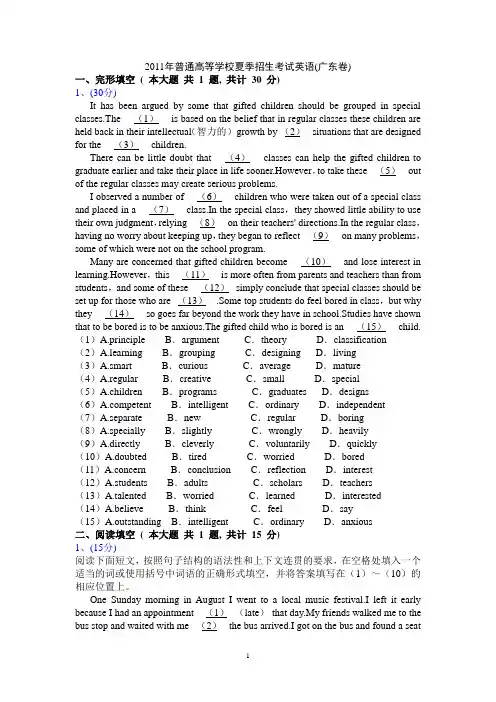
2011年普通高等学校夏季招生考试英语(广东卷)一、完形填空( 本大题共 1 题, 共计30 分)1、(30分)It has been argued by some that gifted children should be grouped in special classes.The __(1)__ is based on the belief that in regular classes these children are held back in their intellectual(智力的)growth by _(2)__ situations that are designed for the __(3)__ children.There can be little doubt that __(4)__ classes can help the gifted children to graduate earlier and take their place in life sooner.However,to take these __(5)__ out of the regular classes may create serious problems.I observed a number of __(6)__ children who were taken out of a special class and placed in a __(7)__ class.In the special class,they showed little ability to use their own judgment,relying __(8)__ on their teachers' directions.In the regular class,having no worry about keeping up,they began to reflect __(9)__ on many problems,some of which were not on the school program.Many are concerned that gifted children become __(10)__ and lose interest in learning.However,this __(11)__ is more often from parents and teachers than from students,and some of these __(12)_ simply conclude that special classes should be set up for those who are _(13)__.Some top students do feel bored in class,but why they __(14)__ so goes far beyond the work they have in school.Studies have shown that to be bored is to be anxious.The gifted child who is bored is an __(15)__ child. (1)A.principle B.argument C.theory D.classification(2)A.learning B.grouping C.designing D.living(3)A.smart B.curious C.average D.mature(4)A.regular B.creative C.small D.special(5)A.children B.programs C.graduates D.designs(6)petent B.intelligent C.ordinary D.independent(7)A.separate B.new C.regular D.boring(8)A.specially B.slightly C.wrongly D.heavily(9)A.directly B.cleverly C.voluntarily D.quickly(10)A.doubted B.tired C.worried D.bored(11)A.concern B.conclusion C.reflection D.interest(12)A.students B.adults C.scholars D.teachers(13)A.talented B.worried C.learned D.interested(14)A.believe B.think C.feel D.say(15)A.outstanding B.intelligent C.ordinary D.anxious二、阅读填空( 本大题共 1 题, 共计15 分)1、(15分)阅读下面短文,按照句子结构的语法性和上下文连贯的要求,在空格处填入一个适当的词或使用括号中词语的正确形式填空,并将答案填写在(1)~(10)的相应位置上。
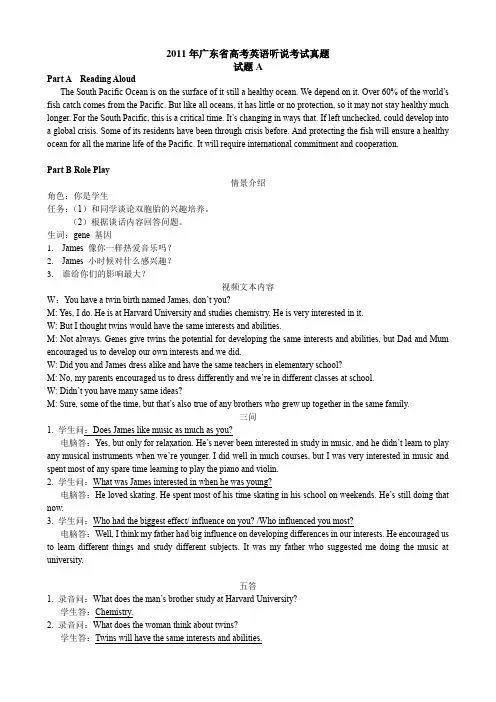
2011年广东省高考英语听说考试真题试题APart A Reading AloudThe South Pacific Ocean is on the surface of it still a healthy ocean. We depend on it. Over 60% of the world’s fish catch comes from the Pacific. But like all oceans, it has little or no protection, so it may not stay healthy much longer. For the South Pacific, this is a critical time. It’s changing in ways that. If left unchecked, could develop into a global crisis. Some of its residents have been through crisis before. And protecting the fish will ensure a healthy ocean for all the marine life of the Pacific. It will require international commitment and cooperation.Part B Role Play情景介绍角色:你是学生任务:(1)和同学谈论双胞胎的兴趣培养。
(2)根据谈话内容回答问题。
生词:gene 基因1.James 像你一样热爱音乐吗?2.James 小时候对什么感兴趣?3.谁给你们的影响最大?视频文本内容W:You have a twin birth named James, don’t you?M: Yes, I do. He is at Harvard University and studies chemistry. He is very interested in it.W: But I thought twins would have the same interests and abilities.M: Not always. Genes give twins the potential for developing the same interests and abilities, but Dad and Mum encouraged us to develop our own interests and we did.W: Did you and James dress alike and have the same teachers in elementary school?M: No, my parents encouraged us to dress differently and we’re in different classes at school.W: Didn’t you have many same ideas?M: Sure, some of the time, but that’s also true of any brothers who grew up together in the same family.三问1. 学生问:Does James like music as much as you?电脑答:Yes, but only for relaxation. He’s never been interested in study in music, and he didn’t learn to play any musical instruments when we’re younger. I did well in much courses, but I was very interested in music and spent most of any spare time learning to play the piano and violin.2. 学生问:What was James interested in when he was young?电脑答:He loved skating. He spent most of his time skating in his school on weekends. He’s still doing that now.3. 学生问:Who had the biggest effect/ influence on you? /Who influenced you most?电脑答:Well, I think my father had big influence on developing differences in our interests. He encouraged us to learn different things and study different subjects. It was my father who suggested me doing the music at university.五答1. 录音问:What does the man’s brother study at Harvard University?学生答:Chemistry.2. 录音问:What does the woman think about twins?学生答:Twins will have the same interests and abilities.3. 录音问:What did the man do in most of his spare time?学生答:He spent most of his spare time learning to play the piano and violin.4. 录音问:Where did James skate on weekends?学生答:In his school.5. 录音问:Who suggested the man doing music?学生答:His father.Part C Retelling梗概:Uncle John 独居,某日侄子Tom 得知叔叔晕倒,请来医生救了他。
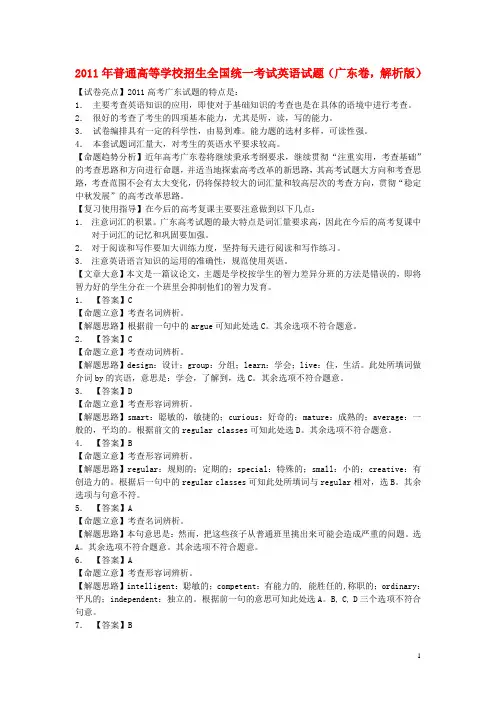
2011年普通高等学校招生全国统一考试英语试题(广东卷,解析版)【试卷亮点】2011高考广东试题的特点是:1.主要考查英语知识的应用,即使对于基础知识的考查也是在具体的语境中进行考查。
2.很好的考查了考生的四项基本能力,尤其是听,读,写的能力。
3.试卷编排具有一定的科学性,由易到难。
能力题的选材多样,可读性强。
4.本套试题词汇量大,对考生的英语水平要求较高。
【命题趋势分析】近年高考广东卷将继续秉承考纲要求,继续贯彻“注重实用,考查基础”的考查思路和方向进行命题,并适当地探索高考改革的新思路,其高考试题大方向和考查思路,考查范围不会有太大变化,仍将保持较大的词汇量和较高层次的考查方向,贯彻“稳定中秋发展”的高考改革思路。
【复习使用指导】在今后的高考复课主要要注意做到以下几点:1.注意词汇的积累。
广东高考试题的最大特点是词汇量要求高,因此在今后的高考复课中对于词汇的记忆和巩固要加强。
2.对于阅读和写作要加大训练力度,坚持每天进行阅读和写作练习。
3.注意英语语言知识的运用的准确性,规范使用英语。
【文章大意】本文是一篇议论文,主题是学校按学生的智力差异分班的方法是错误的,即将智力好的学生分在一个班里会抑制他们的智力发育。
1.【答案】C【命题立意】考查名词辨析。
【解题思路】根据前一句中的argue可知此处选C。
其余选项不符合题意。
2.【答案】C【命题立意】考查动词辨析。
【解题思路】design:设计;group:分组;learn:学会;live:住,生活。
此处所填词做介词by的宾语,意思是:学会,了解到,选C。
其余选项不符合题意。
3.【答案】D【命题立意】考查形容词辨析。
【解题思路】smart:聪敏的,敏捷的;curious:好奇的;mature:成熟的;average:一般的,平均的。
根据前文的regular classes可知此处选D。
其余选项不符合题意。
4.【答案】B【命题立意】考查形容词辨析。
【解题思路】regular:规则的;定期的;special:特殊的;small:小的;creative:有创造力的。
2011年普通高等学校招生全国统一考试(广东卷)英语参考答案与解题提示【文章大意】本文是一篇议论文,主要讲学校按学生的智力差异分班的方法是错误的,即将智力高的学生分在一个班里会抑制他们的智力发育。
1.【答案】C【命题立意】考查名词辨析。
【解题思路】根据上文中的“It has been argued...”可知,此处argument意为“论点,论据”,符合文意,故选C。
2.【答案】C【命题立意】考查名词辨析。
【解题思路】designing意为“设计”;grouping意为“分组”;learning意为“学习”;living意为“生活”。
根据最后一段第一句中的“... lose interest in learning”可知,C项符合语境。
3.【答案】D【命题立意】考查形容词辨析。
【解题思路】smart意为“聪敏的,敏捷的”;curious意为“好奇的”;mature 意为“成熟的”;average意为“一般的,平均的”。
根据上文中的“in regular classes...”可知,此处D项符合文意。
4.【答案】B【命题立意】考查形容词辨析。
【解题思路】根据第三段第二句中的“In the special class...”可知,此处应为special 意为“特别的”,B项符合题意。
5.【答案】A【命题立意】考查名词辨析。
【解题思路】句意为:然而,把这些孩子从普通班里挑出来可能会造成严重的问题。
故A 项符合文意。
6.【答案】A【命题立意】考查形容词辨析。
【解题思路】intelligent意为“聪敏的”;competent意为“有能力的,能胜任的,称职的”;ordinary意为“平凡的”;independent意为“独立的”。
根据上下文内容及第一段第一句中的“gifted”可知,此处A项符合语境。
7.【答案】B【命题立意】考查形容词辨析。
【解题思路】separate意为“独立的”;regular意为“定期的,规则的;一般的”;new 意为“新的”;boring意为“无聊的”。
2011年普通高等学校招生全国统一考试(广东卷)A卷英语Ⅰ。
语言知识及应用(共两节。
满分35分)第一节完形填空(共15小题;每小题2分,满分30分)阅读下面短文,掌握其大意,然后从1~15各题所给的A、B、C和D项中,选出最佳选项,并在答题卡上将该项涂黑。
It has been argued by some that gifted children should be grouped in special classes. The 1 has been on the belief that in regular classes these children are held back in their intellectual (智力的) growth by 2 situation that has designed for the 3 children.There can be little doubt that 4 classes can help the gifted children to graduate earlier and take their place in life sooner。
However,to take these 5 out of the regular classes may create serious problems。
I observed a number of 6 children who were taken out of a special class and placed in a7 class。
In the special class, they showed little ability to use their own judgment,relying 8 on their teachers' directions。
In the regular class, having no worry about keeping up,they began to reflect 9 on many problems,some of which were not on the school program。
2011年普通高等学校招生全国统一考试(广东卷) A卷英语Ⅰ. 语言知识及应用(共两节。
满分35分)第一节完形填空(共15小题;每小题2分,满分30分)阅读下面短文,掌握其大意,然后从1~15各题所给的A、B、C和D项中,选出最佳选项,并在答题卡上将该项涂黑。
It has been argued by some that gifted children should be grouped in special classes. The 1 has been on the belief that in regular classes these children are held back in their intellectual (智力的) growth by 2 situation that has designed for the 3 children.There can be little doubt that 4 classes can help the gifted children to graduate earlier and take their place in life sooner. However, to take these 5 out of the regular classes may create serious problems.I observed a number of 6 children who were taken out of a special class and placed in a7 class. In the special class, they showed little ability to use their own judgment, relying 8 on their teachers‟ directions. In the regular class, having no worry about keeping up, they began to reflect 9 on many problems, some of which were not on the school program.Many are concerned that gifted children become 10 and lose interest in learning. However this 11 is more often from parents and teachers than from students, and some of these 12 simply conclude that special classes should be set up for those who are 13 . Some top students do feel bored in class, but why they 14 so goes far beyond the work they have in school. Studies have shown that to be bored is to be anxious. The gifted child who is bored is an 15 child.1. A. principle B. theory C. arguments D. classification2. A. designing B. grouping C. learning D. living3. A. smart B. curious C. mature D. average4. A. regular B. special C. small D. creative5. A. children B. programs C. graduates D. designs6. A. intelligent B. competent C. ordinary D. independent7. A. separate B. regular C. new D. boring8. A. specially B. slightly C. wrongly D. heavily9. A, directly B. cleverly C. voluntarily D. quickly10. A. doubted B. bored C. worried D. tired11. A. concern B. conclusion C. reflection D. interest12. A. students B. adults C. scholars D. teachers13. A. talented B. worried C. learned D. interested14. A. believe B. think C. say D. feel15. A. outstanding B. intelligent C. anxious D. ordinary原文出处/english1/grade_b/unit5/unit8_text.html1.答案:C解析:考查名词,运用原词重现方法。
2011年普通高等学校招生全国统一考试(全国卷)英语第一卷注意事项:1.答题前,考生在答题卡上务必用直径0.5 毫米的黑色墨水签字笔将自己的姓名、准考证号填写清楚,并贴好条形码。
请认真核对条形码上的准考证号、姓名和科目。
2.每小题选出答案后,用2B铅笔把答题卡上对应题目的答案标号涂黑。
如需改动,用橡皮擦干净后,再选涂其他答案的标号。
在试题卷上作答无效。
第一部分听力(共两节,满分30分)做题时,先将答案标在试卷上,录音内容结束后,你将有两分钟的时间将你的答案转涂到客观题答题卡上。
第一节(共5小题:每小题1.5分,满分7.5分)听下面5段对话。
每段对话后有一小题,从题中所给出的A.B.C三个选项中选出最佳选项,并标在试卷的相应位置。
听完每段对话后,你都有10秒钟的时间来回答有关小题和阅读下一小题,每段对话仅读一遍。
例:How mony is the shirt?A. $19.15B. $9.15C. $9.18答案是 B1. What dose the man like about the play?A.The storyB. The endingC. The actor2. Which place are the speakers trying to find?A.A hotel.B.A bankC.A reastnurant.3. At what time will the two speakers meet?A.5:20.B.5:10.C.4:40.4. What will the man do?A.Change the planB.Wait for a phone call.C.Sort things out.5. What does the woman want to do?A. See a film with the man.B. Offer the man some help.C.listen to some great music.第二节(共15小题:每小题1.5分,满分22.5分)听下面5段对话,每段对话后有几个小题,从题中所给的A、B、C三个选项中选出最佳选项,并标在试卷的相应位置。
2011广东卷解析【试卷亮点】2011高考广东试题的特点是:1.主要考查英语知识的应用,即使对于基础知识的考查也是在具体的语境中进行考查。
2.很好的考查了考生的四项基本能力,尤其是听,读,写的能力。
3.试卷编排具有一定的科学性,由易到难。
能力题的选材多样,可读性强。
4.本套试题词汇量大,对考生的英语水平要求较高。
【命题趋势分析】近年高考广东卷将继续秉承考纲要求,继续贯彻“注重实用,考查基础”的考查思路和方向进行命题,并适当地探索高考改革的新思路,其高考试题大方向和考查思路,考查范围不会有太大变化,仍将保持较大的词汇量和较高层次的考查方向,贯彻“稳定中秋发展”的高考改革思路。
【复习使用指导】在今后的高考复课主要要注意做到以下几点:1.注意词汇的积累。
广东高考试题的最大特点是词汇量要求高,因此在今后的高考复课中对于词汇的记忆和巩固要加强。
2.对于阅读和写作要加大训练力度,坚持每天进行阅读和写作练习。
3.注意英语语言知识的运用的准确性,规范使用英语。
【文章大意】本文是一篇议论文,主题是学校按学生的智力差异分班的方法是错误的,即将智力好的学生分在一个班里会抑制他们的智力发育。
1.【答案】C【命题立意】考查名词辨析。
【解题思路】根据前一句中的argue可知此处选C。
其余选项不符合题意。
2.【答案】C【命题立意】考查动词辨析。
【解题思路】design:设计;group:分组;learn:学会;live:住,生活。
此处所填词做介词by的宾语,意思是:学会,了解到,选C。
其余选项不符合题意。
3.【答案】D【命题立意】考查形容词辨析。
【解题思路】smart:聪敏的,敏捷的;curious:好奇的;mature:成熟的;average:一般的,平均的。
根据前文的regular classes可知此处选D。
其余选项不符合题意。
4.【答案】B【命题立意】考查形容词辨析。
【解题思路】regular:规则的;定期的;special:特殊的;small:小的;creative:有创造力的。
2011年高考广东卷英语试题(答案)完形填空:【要点导读】本文是一篇议论文。
文章就有天赋的学生是不是应该进特殊班的问题进行了讨论,调查表明被分在特殊班的学生并没有人们想象的好效果,特殊班里的学生过分依赖老师的引导,反而对学习失去了兴趣。
文章主题是学校按学生的智力差异分班的方法是错误的,即将智力好的学生分在一个班里会抑制他们的智力发育。
1.【答案】C【命题立意】考查名词辨析。
【解题思路】根据前一句中的argue可知此处选C。
其余选项不符合题意。
2.【答案】C【命题立意】考查动词辨析。
【解题思路】design:设计;group:分组;learn:学会;live:住,生活。
此处所填词做介词by的宾语,意思是:学会,了解到,选C。
其余选项不符合题意。
3.【答案】D【命题立意】考查形容词辨析。
【解题思路】smart:聪敏的,敏捷的;curious:好奇的;mature:成熟的;average:一般的,平均的。
根据前文的regular classes可知此处选D。
其余选项不符合题意。
4.【答案】B 【命题立意】考查形容词辨析。
【解题思路】regular:规则的;定期的;special:特殊的;small:小的;creative:有创造力的。
根据后一句中的regular classes可知此处所填词与regular相对,选B。
其余选项与句意不符。
5.【答案】A【命题立意】考查名词辨析。
【解题思路】本句意思是:然而,把这些孩子从普通班里挑出来可能会造成严重的问题。
选A。
其余选项不符合题意。
其余选项不符合题意。
6.【答案】A【命题立意】考查形容词辨析。
【解题思路】intelligent:聪敏的;competent:有能力的, 能胜任的,称职的;ordinary:平凡的;independent:独立的。
根据前一句的意思可知此处选A。
B, C, D三个选项不符合句意。
7.【答案】B【命题立意】考查形容词辨析。
矿产资源开发利用方案编写内容要求及审查大纲
矿产资源开发利用方案编写内容要求及《矿产资源开发利用方案》审查大纲一、概述
㈠矿区位置、隶属关系和企业性质。
如为改扩建矿山, 应说明矿山现状、
特点及存在的主要问题。
㈡编制依据
(1简述项目前期工作进展情况及与有关方面对项目的意向性协议情况。
(2 列出开发利用方案编制所依据的主要基础性资料的名称。
如经储量管理部门认定的矿区地质勘探报告、选矿试验报告、加工利用试验报告、工程地质初评资料、矿区水文资料和供水资料等。
对改、扩建矿山应有生产实际资料, 如矿山总平面现状图、矿床开拓系统图、采场现状图和主要采选设备清单等。
二、矿产品需求现状和预测
㈠该矿产在国内需求情况和市场供应情况
1、矿产品现状及加工利用趋向。
2、国内近、远期的需求量及主要销向预测。
㈡产品价格分析
1、国内矿产品价格现状。
2、矿产品价格稳定性及变化趋势。
三、矿产资源概况
㈠矿区总体概况
1、矿区总体规划情况。
2、矿区矿产资源概况。
3、该设计与矿区总体开发的关系。
㈡该设计项目的资源概况
1、矿床地质及构造特征。
2、矿床开采技术条件及水文地质条件。